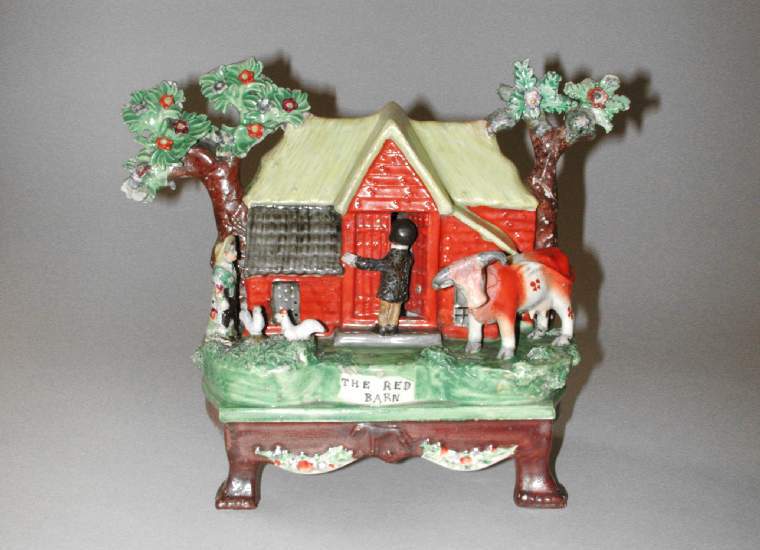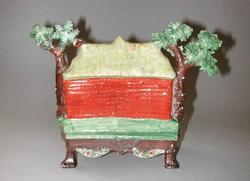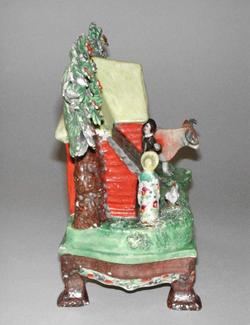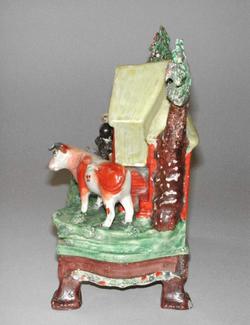Current Location: In storage
Titles
The Red Barn
Maker(s)
Unidentified Pottery
Entities
Categories
Description
Earthenware table figure group, moulded and modelled, lead glazed and painted with polychrome enamels.
Staffordshire group of a thatched red barn flanked by two flowering trees, with a man opening the door and, in front, a woman in a floral dress tending two chickens at left, and a cow at right. The base of the scene, coloured green, has a 3-bow front, the centre section lettered ‘THE RED BARN’. It sits on a four-legged table base, painted brown, with a green top, and decorated with polychrome swags and a small brown moulded dog centre front. The back is almost flat, and painted. The underside of the base is recessed and flat, with two 1.7 cm diameter vent holes.
Notes
History note: Captain Reynolds Collection, London; sold to Messrs Gill and Reigate; Mr Stoner, London, from whom purchased in 1910 by Dr J.W.L. Glaisher, Trinity College, Cambridge. Dr Glaisher paid £125 for this and fourteen other pieces, as part of a purchase of 35 figures and figure groups.
Legal notes
Dr J.W.L. Glaisher Bequest
Measurements and weight
Height: 21.2 cm
Width: 26.6 cm
Acquisition and important dates
Method of acquisition: Bequeathed
(1928)
by
Glaisher, J. W. L., Dr
Dating
19th Century, second quarter
Production date:
circa
AD 1828
Note
Earthenware figure groups were popular from around 1810, although the earliest examples date from nearly a century earlier. A cheaper alternative to porcelain figures, they were often produced by small potteries; very few are marked. Classical or literary subjects were frequently copied from porcelain examples, but potters increasingly turned to scenes from everyday life and topical events. These early figure groups are often complex, including modelled and moulded parts and applied decoration; the backs, though flat, are decorated; bocage (stylised foliage) is common on groups from c.1810-20. However, as demand increased, processes were streamlined to allow mass production and by c.1835 the earlier, relatively costly, methods had largely given way to three-part press-moulding.
Table groups, standing on four or six short legs, were made from c.1825-35; similar features suggest they were made by just a few makers. They have in the past been attributed to Obadaiah Sherratt of Burslem, but without clear evidence; they were probably made by a number of figure makers. However, similarities in the shape and colouring of this table base, the moulded dog ‘mark’ on the front and the bocage suggest this table base group was made by the same potter as two others in the Fitzwilliam Collection.
The group commemorates the murder of Maria Martin by William Corder in the Red Barn, Polstead, Suffolk in 1827. Reported in ‘The Times’ the crime became a national sensation. Some 10,000 people are reported to have attended Corder’s execution at Bury St Edmunds in 1828.
People, subjects and objects depicted
Components of the work
Decoration
composed of
enamel
( green, yellow, red, brown, grey, black)
Decoraton
Parts
Materials used in production
Lead-glaze
Earthenware
Techniques used in production
Lead-glazing
Inscription or legends present
- Text: THE RED/BARN
- Location: On the front of the table base
- Method of creation: Painted
- Type: Inscription
Inscription present: a dog (greyhound); also a dot in same position on back
- Location: Centre front of base
- Method of creation: Moulded
- Type: Mark
References and bibliographic entries
Identification numbers
Accession number: C.962-1928
Primary reference Number: 76461
Old object number: 3203
Stable URI
Audit data
Created: Saturday 6 August 2011
Updated: Monday 29 April 2024
Last processed: Tuesday 15 July 2025
Associated departments & institutions
Owner or interested party:
The Fitzwilliam Museum
Associated department:
Applied Arts







